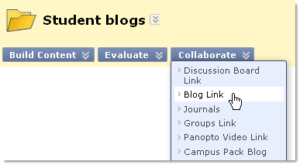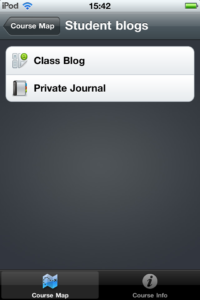During the next few weeks, there will be a number of changes to the systems which the Learntech team supports. Many of these changes have been made as a direct response to feedback which has been provided over the year and will represent a considerable investment in improvements to the current environment.
NILE
Following the decision by the University Executive Team to remain with Blackboard for a further three years, we will be upgrading this to the latest release which will provide a number of security updates and new features. Some of the key changes include an improved look and feel and enhanced features for assessment and monitoring. A separate page provides full details on these changes.
As previously announced, there will be a move from the Campus Pack blogs and wikis within NILE to using the Blackboard tools. Staff should continue to migrate content out of these areas if required and ensure they are familiar with the new tools.
As part of closer integration with the student record system, student demand for greater clarity and the future need to transfer grades from NILE, there will be a change to the way in which modules and courses are setup. All courses and modules will be created on NILE as they are validated, using an agreed template. Students will be automatically added, and when the site has been developed and made available by the tutor, students will see this in their list of modules when they login to NILE. For full details on the QNIG project, please view the blog posting.
SaGE (Submission and Grading Electronically)
The above changes to NILE will support the University drive to move to e-submission and grading of work, as the site template will help tutors to provide clearer instructions to students on where they need to submit work and how they will obtain results. The SaGE blog continues to be updated with the latest information and guidance.
MyPAD (e-portfolios)
Following the announcement on May 2nd the product which currently underpins MyPAD will be replaced with a new system based on WordPress (supplied by Edublogs). This will provide significantly improved flexibility for students in their choice of layout and ability to share with a wide range of individuals. Some tutors within The School of Health are continuing to use PebblePad where there is a need for highly structured portfolios.
Northampton YouTube
During 2012, a new product for video streaming similar to that used by YouTube will be introduced to Northampton. Provided by Kaltura, there will be a significant improvement in the integration with NILE and in the functionality over our current video streaming system. Further details will be made available as this work progresses.
Mobile (iNorthampton)
As of May 2012, there have been nearly 10,000 downloads of the iNorthampton app. A further update to iNorthampton is planned shortly based on feedback to the first phase – keep an eye on the website for the latest project news.
All of the above changes represents a considerable investment and improvement in the Learning Technology environment. Do not panic as the Learntech team are here to help you and many of the changes are additional features to the current systems.
If you wish to discuss some of these improvements in more detail then please come along to one of theLearntech Friday sessions or just contact the team at any time.
This case study highlights a pilot run by Janet Jackson, a Senior Lecturer in Environmental Sciences in the School of Science & Technology. The pilot introduced the use of mobile technology on two field trips, to Wicken Fen and Stonehenge.
The main aims of this pilot were to allow the students to document and reflect on their findings whilst in the context (in this case the field trips), and then to access and re-use that information outside of the context.
Students enjoyed using the devices, particularly for photography and video, which helped them to record a lot of data very easily. 80% of the students said that the app was ‘easy’ or ‘very easy’ to use.
Learning across contexts – mobile for fieldwork (case study, PDF 638KB)
This case study reports findings from a pilot run in stage 2 of Foundation Art and Design (Nov 2011-Feb 2012) by Jayne Corfield in the School of Arts.
Online spaces in NILE, which are easily accessible using mobile technology, were set up for students to document and reflect on their work anytime, anywhere, across any context.
Learner generated contexts – mobile for anytime anywhere learning (case study, PDF 511KB)
Watch the video here.
Why have I suddenly got two blog tools appearing in my NILE site?
The blog tools that we have always had in NILE are actually plug-ins (that is, they are made by a different software company to the people who make NILE, and are literally ‘plugged in’ to the NILE platform). If you have used blogs in the past, you will be familiar with the ones that look like this:
 These tools are still available for you to use – you will see this option referred to as ‘Campus Pack blog’ in the tools list in your NILE sites. Sadly though this tool does not yet work so well with the mobile version of NILE in the new iNorthampton app. So for those of you who would prefer your students to be able to blog on the move, we have also switched on the blogging tools that are built in to NILE. You will now see extra options for ‘Blogs’ (or Blog Link from the Collaborate button) and ‘Journals’ in your NILE site.
These tools are still available for you to use – you will see this option referred to as ‘Campus Pack blog’ in the tools list in your NILE sites. Sadly though this tool does not yet work so well with the mobile version of NILE in the new iNorthampton app. So for those of you who would prefer your students to be able to blog on the move, we have also switched on the blogging tools that are built in to NILE. You will now see extra options for ‘Blogs’ (or Blog Link from the Collaborate button) and ‘Journals’ in your NILE site.
What’s the difference?
The built-in blog tools are better at some things, and worse at others, in comparison to the Campus Pack plug-in blogs. Here are the main things you need to know:
- Both tools will allow you to have a group blog, or a private blog that can only be seen by the individual and the tutor. In the Campus Pack blog this is a setting in the blog tool when you create it, whereas the built-in version has two separate tools for this – the ‘blog’ tool for open groups or shared individual blogs, and the ‘journal’ tool for private individual or group blogging.
- If you are dividing your students into groups within your NILE site, the built in tools will allow you to create a blog and/or journal for each group when you create the group. With the Campus Pack tools, you have to do this separately – create the groups first, then create the blogs and allocate them.
- Both tools will allow you to create a column in the grade centre and specify grades for students’ work. The built-in blog and journal tools will allow you to add grades within the blog itself, while you’re checking the posts. This feature is not available in the Campus pack tool.
 The built in tools do not currently have an RSS or email subscription option, or an export option, and they do not have granular permission levels (for example, allowing non-members to view a group blog). If you need this kind of granularity, please ask the team for advice.
The built in tools do not currently have an RSS or email subscription option, or an export option, and they do not have granular permission levels (for example, allowing non-members to view a group blog). If you need this kind of granularity, please ask the team for advice.- The built in blog and journal tools are easy to access on a smartphone, via the iNorthampton app. The Campus Pack blogs do not currently display well in mobile browsers.
Tell us what you think
If you are a regular user of blogs in NILE, we’d love to hear your thoughts on either or both of these tools. Please send us any questions or comments at: LTSupport@northampton.ac.uk.
Switching tools off in NILE
Don’t forget that if you only want to use one of these tools, you can switch the other one off to avoid confusion (or if you prefer, you can switch off both!). To do this, go to your Control Panel and click on Customisation, and then Tool Availability. Remove the ticks for any of the tools you don’t use in your site.
This guide is based on discussion and contributions by the E-learning and the First Year Student Experience (ELFYSE) special interest group (SIG).
Bringing together the areas of e-learning and student transition, retention and progression, this guide draws on both theory and practice to provide recommendations for and guidance to both academic and support staff on using learning technologies to support the first-year student experience. It is designed to help you think about ways of approaching and incorporating the use of learning technologies to support and enhance your students’ first-year experience.
Our own Learning Technologist, Julie Usher has contributed to two of the articles which have been included:
“Addressing issues of plagiarism in the first year” and “Easing cultural transition through peer-to-peer interactions”
Recent Posts
- Blackboard Upgrade – February 2026
- Blackboard Upgrade – January 2026
- Spotlight on Excellence: Bringing AI Conversations into Management Learning
- Blackboard Upgrade – December 2025
- Preparing for your Physiotherapy Apprenticeship Programme (PREP-PAP) by Fiona Barrett and Anna Smith
- Blackboard Upgrade – November 2025
- Fix Your Content Day 2025
- Blackboard Upgrade – October 2025
- Blackboard Upgrade – September 2025
- The potential student benefits of staying engaged with learning and teaching material
Tags
ABL Practitioner Stories Academic Skills Accessibility Active Blended Learning (ABL) ADE AI Artificial Intelligence Assessment Design Assessment Tools Blackboard Blackboard Learn Blackboard Upgrade Blended Learning Blogs CAIeRO Collaborate Collaboration Distance Learning Feedback FHES Flipped Learning iNorthampton iPad Kaltura Learner Experience MALT Mobile Newsletter NILE NILE Ultra Outside the box Panopto Presentations Quality Reflection SHED Submitting and Grading Electronically (SaGE) Turnitin Ultra Ultra Upgrade Update Updates Video Waterside XerteArchives
Site Admin

